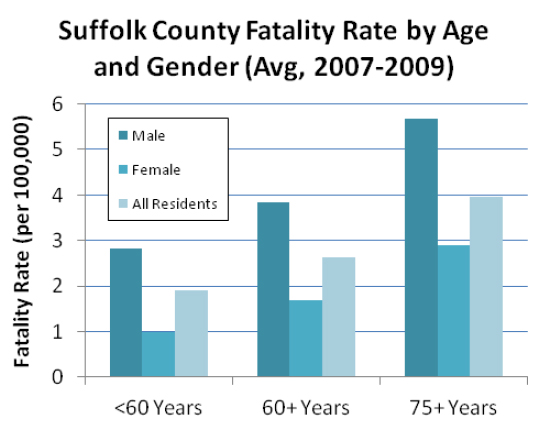
This month, Tri-State was invited to testify at the Suffolk County legislature’s Welfare to Work Commission hearings on poverty in suburbia. In testimony at the hearing, Tri-State Policy Director Ryan Lynch focused his comments [pdf] on the almost 6% of households in the county that do not have access to an automobile. While transportation is an integral component of daily life on Long Island, Suffolk County’s transportation system does not work for everyone. Tri-State encouraged the county to turn its attention to enhancing transportation options for all residents, but in particular, those that travel by transit, bicycle, or on foot.
Lynch spoke about the many households in Suffolk County without cars, which overwhelmingly earn much less than those with automobiles. On average, households without access to an automobile in Suffolk County earn $34,529 a year, or roughly $50,000 less than households with automobiles.
At the same time, transit riders are confronted with high—and growing—fares. A monthly Long Island Rail Road pass from Babylon to New York costs $299; from Montauk, it’s $429. Meanwhile, riding Suffolk County Transit (SCT), the county’s local public transportation service, just got more expensive too. The county recently enacted a 33% bus fare increase in one fell swoop, even though Tri-State and other advocates urged the Suffolk County legislature and County Executive Steve Bellone to phase the increase in over three years. This recent fare hike will end up costing round-trip weekday bus riders about $100 more in 2012.
Despite these rising fares, SCT ridership is growing. During January and February of this year, SCT ridership was up by over 25,000 trips as compared to the same time period in 2011. Annual ridership in 2010 exceeded 6.5 million riders, the second highest in the system’s history, and ridership is 42% higher than ridership in 2000. In light of these ridership increases, Tri-State urged state elected officials from Suffolk County to give greater support to transit riders’ demand for expanded Sunday service on core routes.
Tri-State’s testimony also focused on Suffolk County Accessible Transportation (SCAT), which serves approximately 500,000 trips a year. Many SCAT riders, including Suffolk County’s aging population, live on fixed incomes, but in County Executive Bellone’s recent budget mitigation proposal, adopted by the Suffolk County legislature, a fare increase of $1 was planned for one-way SCAT trips. This means that a daily, roundtrip, weekday rider on SCAT will have to pay an additional $522 per year for the same level of service.

According to Tri-State’s testimony, poor support for transit is not the only way that low-income and elderly communities are impacted by inadequate transportation facilities in Suffolk County. For those that do not have access to an automobile and/or transit service, the failure to invest in simple things like pedestrian safety infrastructure or safe cycling options puts Suffolk County’s working poor and seniors at increased risk for injury and death. Studies have shown that America’s poor pedestrian infrastructure disproportionately impacts low-income households and communities of color. Furthermore, according to Tri-State’s Older Pedestrians at Risk report, people aged 60 years and older comprised 23.4% of Suffolk County’s 94 pedestrians killed in the three years from 2007 through 2009, though they made up only 18.5% of the population. Those seniors 75 years and older accounted for only 6.1% of the total population, but made up 11.7% of pedestrian fatalities during the same time period.
Tri-State called for the county to adopt a complete streets policy to ensure that all residents of Suffolk County can safely use the road network.

[…] The proposed fare hike was part of County Executive Steve Bellone’s deficit mitigation plan, which set its sights on Suffolk’s $530 million budget gap, but the measure attracted the attention of lawmakers and advocates. […]
[…] the causes and potential solutions to poverty in Suffolk County, and Tri-State was invited to testify in front of the Commission earlier this year. In testimony, Tri-State’s associate director Ryan […]